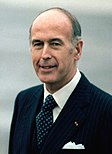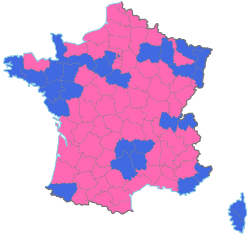French presidential election, 1981
|
|
||||||||||||||||||||||
|
||||||||||||||||||||||
|
||||||||||||||||||||||
|
|
||||||||||||||||||||||
| Results of the second round: the candidate with the plurality of votes in each administrative division. Valéry Giscard d'Estaing: blue; François Mitterrand: pink | ||||||||||||||||||||||
|
||||||||||||||||||||||
The French presidential election of 1981 took place on 10 May 1981, giving the presidency of France to François Mitterrand, the first Socialist president of the Fifth Republic.
In the first round of voting on 26 April 1981, a political spectrum of ten candidates stood for election, and the leading two candidates – Mitterrand and Valéry Giscard d'Estaing – advanced to a second round. Mitterrand and his Socialist Party received 51.76% of the vote, while Giscard and his Union for French Democracy trailed with about 48.24%, a margin of 1,065,956 votes.
The Socialist Party's electoral program was called 110 Propositions for France. Mitterrand served as President of France for the full seven-year term (1981–1988) and won re-election in 1988.
The most important set of circumstances that gave François Mitterrand the advantage over President Valéry Giscard d'Estaing was Giscard’s incumbency itself. Usually, being an incumbent is an advantage. This was not the case, however, during the 1981 French elections. The incumbent seemed to have been cursed with many financial and political misfortunes during his presidential term; these crippling situations included internal matters that he could have controlled (and chose to ignore), and external forces that were beyond the incumbent’s control.
...
Wikipedia



